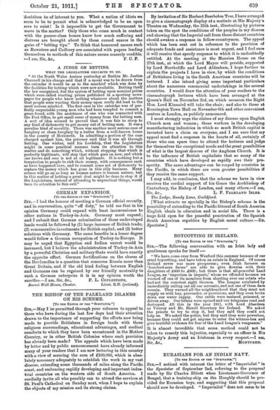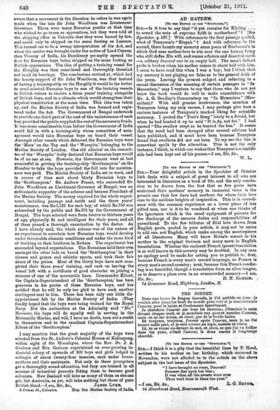EURASIANS FOR AN INDIAN NAVY. [To TEE EDITOR OF TIN
"SFICTAT01:1 Srn,—I noticed with interest the letter of "Imperialist " in the Spectator of September 2nd, referring to the proposal made by Sir Charles Elliott when Lieutenant-Governor of Bengal, that a training-ship on the Hooghly should be pro- vided for Eurasian boys, and suggesting that this proposal should now be developed. " Imperialist " does not seem to be aware that a movement in the direction he refers to was again made when the late Sir John Woodburn was Lieutenant- Governor. There were many Eurasian youths at that time who wished to go to sea as apprentices, but they were told at the shipping office in Calcutta that they were barred by law, and could only be shipped on the same footing as Lascars. This turned out to be a wrong interpretation of the Act, and when the matter was brought under the notice of Lord Curzon, then Viceroy of India, his Excellency promptly opened the door for Eurasian boys being shipped on the same footing as British apprentices. The idea of getting a training vessel for the Hooghly was then considered and thoroughly threshed out in all its bearings. The conclusions arrived at, which had the hearty support of Sir John Woodburn, was that instead of having a training-ship on the Hooghly it would be far better to send selected Eurasian boys to one of the training vessels in British waters to receive a three years' training alongside of British boys, and in a climate which would strengthen their physical constitution at the same time. This idea was taken up, and the Marine Society of India was formed and regis- tered under the Act. The Government of Bengal undertook to provide one-third part of the cost of the maintenance of each boy, provided the public supplied the rest of the necessary funds. It was some considerable time before the Government of India could fall in with a training-ship whose committee of man- agement would take Eurasian boys on board their vessel. Amongst other vessels which debarred the Eurasian boys were the 'Mars' on the Tay and the' Warspite,' belonging to the Marine Society of London. One old admiral on the commit- tee of the Warspite' hotly declared that Eurasian boys would be of no use at sea. However, the Government were at last successful in getting the training-ship Southampton' on the Humber to take the boys provided the full rate for mainten- ance was paid. The Marine Society of India set to work, and in course of time sent about thirty Eurasian boys to the Southampton.' Sir Andrew Fraser, who succeeded Sir John Woodburn as Lieutenant-Governor of Bengal, was an enthusiastic supporter of the scheme and became President of the Marine Society. The money required for the whole experi- ment, including passage and outfit and the three years' maintenance, was Rs.1.125 for each boy, of which Rs.750 was subscribed by the public and Rs.375 by the Government of Bengal. The boys selected were from twelve to thirteen years of age, physically fit and intelligent for their years, and all of them passed a thorough examination by the doctor. As I have already said, the whole scheme was of the nature of an experiment to ascertain how Eurasian boys would develop under favourable climatic conditions and under the same kind of training as their brethren in Britain. The experiment has succeeded beyond expectations. The Eurasians held their own amongst the other lads on board the ' Southampton' in their classes and games and athletic sports, and took their fair share of the prizes. Most of the thirty boys have now com- pleted their three years' training, and each on leaving the vessel left with a certificate of good character on joining a steamer of one of the mercantile lines. Commander Kitcat, the Captain-Superintendent of the 'Southampton,' has been generous in his praise of these Eurasian boys, and has notified that he will be only too glad to have such another contingent sent to him. There has been only one little dis- appointment felt by the Marine Society of India. 'They fondly hoped that the boys were being trained for the Royal Navy. But the authorities at the Admiralty said "No." However, the boys will do equally well in serving in the Mercantile Marine, and will, I have no doubt, turn out a credit to themselves and to the excellent Captain-Superintendent Kitcat of the 'Southampton.'
I may mention that the great majority of the boys were selected from the St. Andrew's Colonial Homes at Kalimpong, within sight of the Himalayas, where the Rev. Dr. J. A. Graham and Mrs. Graham superintend an ever-growing in- dustrial colony of upwards of 300 boys and girls lodged in cottages of about twenty-four inmates, each under house- mothers and their assistants. Not only do these youngsters get a thoroughly sound education, but they are trained in all manner of industrial pursuits fitting them to become good colonists. New Zealand will take as many of them as she can get, but Australia, as yet, will take nothing but those of pure British blood.—I am, Sir, &c., JAMES LUXE,
6 Camac St., Calcutta. Hon. Sec. Marine Society of India.















































 Previous page
Previous page